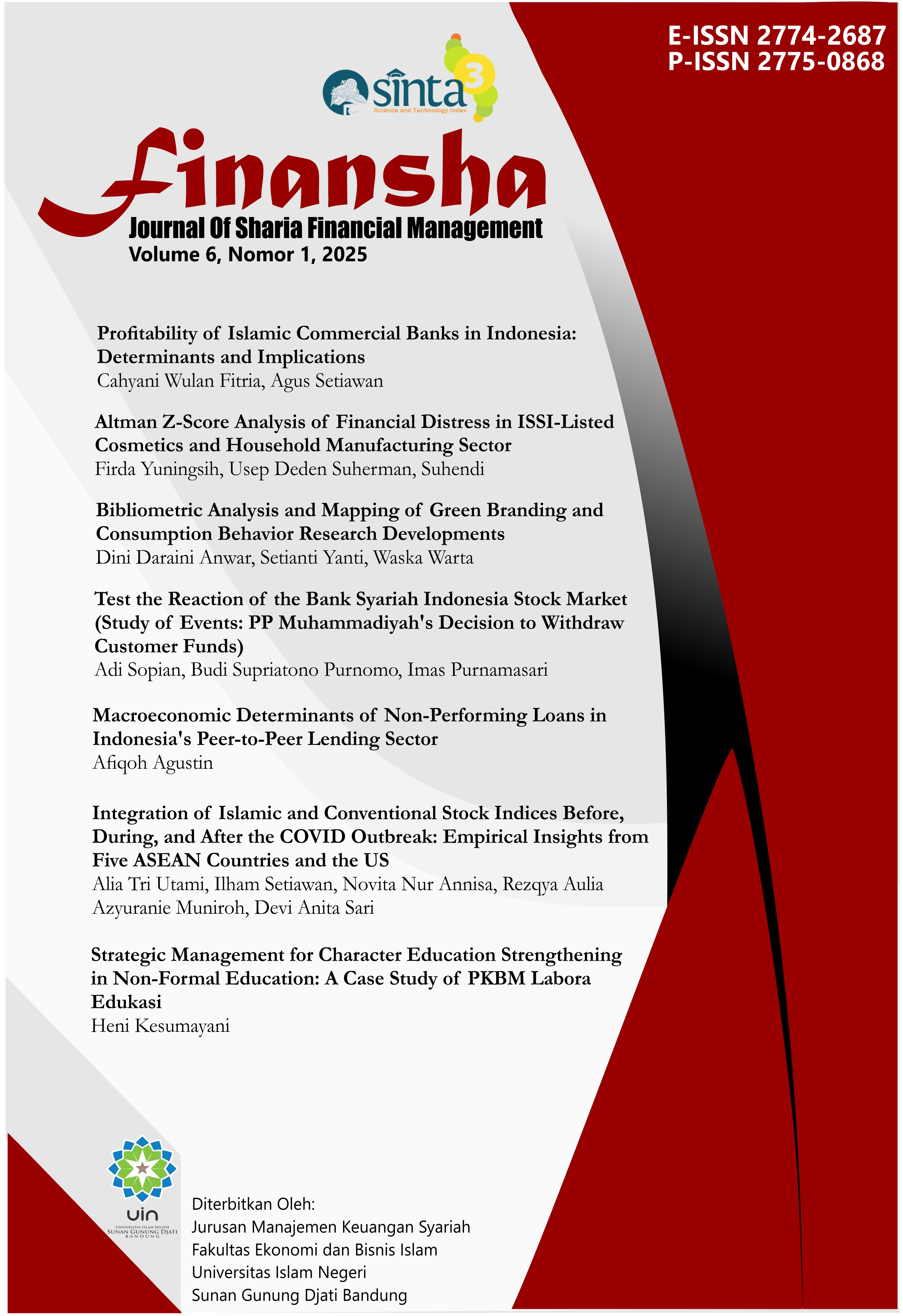BIBLIOMETRIC ANALYSIS AND MAPPING OF GREEN BRANDING AND CONSUMPTION BEHAVIOR RESEARCH DEVELOPMENTS
DOI:
https://doi.org/10.15575/fjsfm.v6i1.41783Keywords:
Bibliometrics, Consumption Behavior, Green Branding, Green Marketing, SustainabilityAbstract
The increasing public awareness and concern about environmental issues has shifted the tendency of consumers to choose a product more selectively, the rise in environmental concerns has also led to emergence of green branding concept. The research used bibliometric analysis of the scholarly discourse surrounding green branding from the years 2010 to 2024, utilizing the Scopus database to examinate the large data about various papers included in this study. Biblioshiny and VOSviewer software were used to analyse keyword co-occurrence and co-authorship in this topic. The result showing that the largest number of papers on green branding appeared in 2024, indicating there’s a growing academic interest in green branding topic. This study contributes to enhancing direction for researchers to examine the topic of green branding by offering the details of the journals information, authors, and countries that hold significant role in the green branding study alongside the terminology that frequently employed in green branding studies
References
Chen, Y.-S. (2010). The Drivers of Green Brand Equity: Green Brand Image, Green Satisfaction, and Green Trust. Journal of Business Ethics, 93(2), 307–319. https://doi.org/10.1007/s10551-009-0223-9
Chen, Y.-S., Lai, S.-B., & Wen, C.-T. (2006). The Influence of Green Innovation Performance on Corporate Advantage in Taiwan. Journal of Business Ethics, 67(4), 331–339. https://doi.org/10.1007/s10551-006-9025-5
Danko, Y., & Nifatova, O. (2022). Agro-sphere determinants of green branding: eco-consumption, loyalty, and price premium. Humanities and Social Sciences Communications, 9(1), 77. https://doi.org/10.1057/s41599-022-01077-9
Delgadoâ€Ballester, E., & Luis Munueraâ€Alemán, J. (2005). Does brand trust matter to brand equity? Journal of Product & Brand Management, 14(3), 187–196. https://doi.org/10.1108/10610420510601058
Dolhey, S. (2019). A bibliometric analysis of research on entrepreneurial intentions from 2000 to 2018. Journal of Research in Marketing and Entrepreneurship, 21(2), 180–199. https://doi.org/10.1108/JRME-02-2019-0015
Dorsch, I. (2018). Becoming Metric-Wise: A Bibliometric Guide for Researchers. RonaldRousseau, LeoEgghe, and RafGuns. Cambridge, MA: Chandos Publishing, 2018. 402 pp. 125.00 (paperback). (ISBN 9780081024744): Becoming Metric-Wise: A Bibliometric Guide for Researchers. Ronald Rousseau , Leo Egghe , and Raf Guns . Cambridge, MA: Chandos Publishing, 2018. 402. Journal of the Association for Information Science and Technology, 70. https://doi.org/10.1002/asi.24108
Hartmann, P., Apaolaza Ibáñez, V., & Forcada Sainz, F. J. (2005). Green branding effects on attitude: functional versus emotional positioning strategies. Marketing Intelligence & Planning, 23(1), 9–29. https://doi.org/10.1108/02634500510577447
Huang, J.-W., & Li, Y.-H. (2017). Green Innovation and Performance: The View of Organizational Capability and Social Reciprocity. Journal of Business Ethics, 145(2), 309–324. https://doi.org/10.1007/s10551-015-2903-y
Huang, Y.-C., Yang, M., & Wang, Y.-C. (2014). Effects of green brand on green purchase intention. Marketing Intelligence & Planning, 32(3), 250–268. https://doi.org/10.1108/MIP-10-2012-0105
Khandelwal, U., Tripathi, V., & Gupta, A. (2024). A Bibliometric Analysis of Green Branding Research from 2000 to 2019. Vision: The Journal of Business Perspective, 28(1), 87–97. https://doi.org/10.1177/09722629211033916
Liu, S. (2023). A Study Based on Contemporary Consumer Behavior of Women of Different Age Groups. Advances in Economics, Management and Political Sciences, 52(1), 37–43. https://doi.org/10.54254/2754-1169/52/20230687
Mohamed, M. (2007). A hierarchical analysis of the green consciousness of the Egyptian consumer. Psychology and Marketing, 24, 445–473. https://doi.org/10.1002/mar.20168
Paul, J., Modi, A., & Patel, J. (2016). Predicting green product consumption using theory of planned behavior and reasoned action. Journal of Retailing and Consumer Services, 29, 123–134. https://doi.org/10.1016/j.jretconser.2015.11.006
Pickettâ€Baker, J., & Ozaki, R. (2008). Proâ€environmental products: marketing influence on consumer purchase decision. Journal of Consumer Marketing, 25(5), 281–293. https://doi.org/10.1108/07363760810890516
Pilkington, A., & Meredith, J. (2009). The evolution of the intellectual structure of operations management—1980–2006: A citation/coâ€citation analysis. Journal of Operations Management, 27(3), 185–202. https://doi.org/10.1016/j.jom.2008.08.001
Schiniotakis, N., & Divini, K. (2024). Green branding: A successful digital strategy. Journal of Brand Strategy, 12(4), 404. https://doi.org/10.69554/KGRT7564
Shi, Z., Xing, K., Rameezdeen, R., & Chow, C. W. K. (2024). Current trends and future directions of global research on wastewater to energy: a bibliometric analysis and review. Environmental Science and Pollution Research, 31(14), 20792–20813. https://doi.org/10.1007/s11356-024-32560-2
Steg, L., & Vlek, C. (2009). Encouraging pro-environmental behaviour: An integrative review and research agenda. Journal of Environmental Psychology, 29(3), 309–317. https://doi.org/10.1016/j.jenvp.2008.10.004
Downloads
Published
How to Cite
Issue
Section
Citation Check
License
Authors who publish with this journal agree to the following terms:
- Authors retain copyright and grant the journal right of first publication with the work simultaneously licensed under a Creative Commons Attribution License that allows others to share the work with an acknowledgment of the work's authorship and initial publication in this journal.
- Authors are able to enter into separate, additional contractual arrangements for the non-exclusive distribution of the journal's published version of the work (e.g., post it to an institutional repository or publish it in a book), with an acknowledgment of its initial publication in this journal.
- Authors are permitted and encouraged to post their work online (e.g., in institutional repositories or on their website) prior to and during the submission process, as it can lead to productive exchanges, as well as earlier and greater citation of published work (See The Effect of Open Access).

















